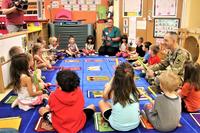1. Be truthful
Children can often sense when they are not being told the truth. As soon as servicemembers and their families start to plan for the deployment, they should sit down and talk openly and honestly with their children. Some parents worry that talking about it too far in advance will only give children more time to worry about the deployment. However, by speaking openly with them, servicemembers and their spouses may be able to help their children adjust to the idea in advance and work through their emotions and reactions related to the upcoming deployment. Children's imaginations often paint a far worse picture than reality, and candid discussion can ease children's minds and prevent them from worrying unnecessarily.
2. Be available for children
Before the deployment, servicemembers should be available to talk with their children whenever children express the need. Children need time to process what the servicemember has told them about the deployment and may have questions later. servicemembers should let their children know that they can ask questions whenever they think of them.
3. Reassure children
Children may need to be reassured that if their servicemember parent does happen to face danger, the servicemember is well-trained to be careful and will do everything he or she can to stay safe.
4. Share feelings with children
By sharing feelings with children, servicemembers can encourage their children to communicate openly. servicemembers should let their children know that worry and negative thoughts and feelings are normal.
5. Give children responsibilities
Children may be concerned that in a servicemember's absence, they will have to do everything around the house. Before the deployment, servicemembers and their spouses should bestow, rather than dump, responsibilities on children. servicemembers and their spouses should let their children know that they have faith in their children's abilities. By making a show of giving responsibilities to children, servicemembers and their spouses convey that the children are important members of the family.
6. Explore the servicemember's destination
servicemembers can use a map or a globe to show children where they are going and how they will be getting there. servicemembers can research the location with their children to find out about things like weather conditions, cultural norms, or products made in that region. By educating children about where the deployment will be, servicemembers may be able to prevent their children from imagining conditions far worse than what the servicemember will actually face and ease their children's minds.





















